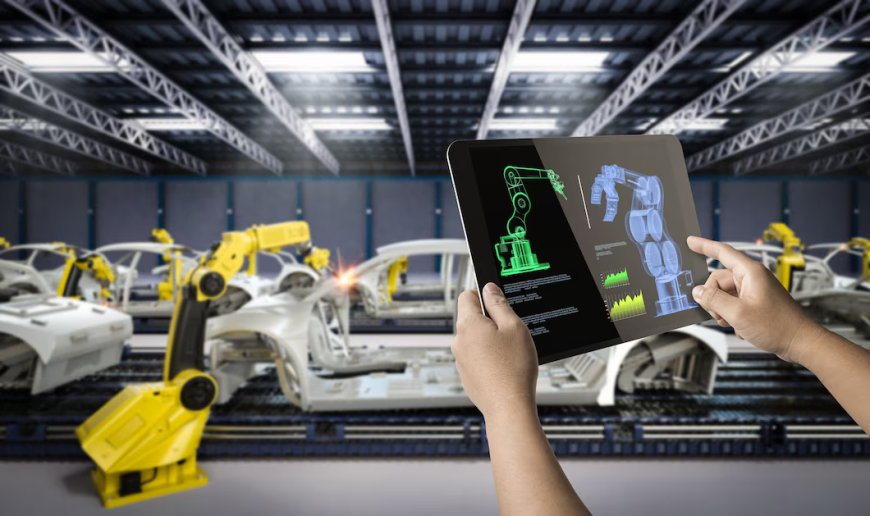AI in Automotive Manufacturing: Revolutionizing the Industry
Discover how AI is transforming automotive manufacturing. From predictive maintenance to quality control, explore the latest trends, benefits, and real-world applications.

The automotive manufacturing sector is experiencing a paradigm shift, thanks to the integration of Artificial Intelligence (AI). AI in automotive manufacturing is becoming a cornerstone of Industry 4.0, driving efficiency, reducing costs, and enhancing product quality in car production. This article delves into how AI is transforming the automotive landscape, its benefits, and its real-world applications.
The Role of AI in Automotive Manufacturing
AI technology is reshaping the traditional methods of vehicle production by automating processes and enabling smarter decision-making. It leverages data, machine learning algorithms, and IoT to streamline operations and improve outcomes. Here are some key areas where AI is making a significant impact:
- Predictive Maintenance AI-driven predictive maintenance helps manufacturers prevent machinery breakdowns. By analyzing data from sensors and equipment, AI predicts potential failures, ensuring smooth operations and minimizing downtime.
- Quality Control AI-powered systems use computer vision and machine learning to detect defects in real-time. This not only enhances the quality of vehicles but also reduces the rate of rework and wastage.
- Supply Chain Optimization AI optimizes supply chain management by forecasting demand, managing inventory, and ensuring timely delivery of parts. It helps manufacturers respond to market dynamics with greater agility.
- Production Line Automation Robotic Process Automation (RPA) integrated with AI streamlines repetitive tasks on assembly lines. This ensures consistent quality and increases production speed.
Benefits of AI in Automotive Manufacturing
The integration of AI in automotive manufacturing offers numerous advantages, including:
- Increased Efficiency: Automated processes reduce human errors and enhance productivity.
- Cost Reduction: By minimizing waste and optimizing resource utilization, AI helps cut production costs.
- Improved Safety: AI-powered robots handle hazardous tasks, ensuring worker safety.
- Enhanced Customer Experience: Better quality control leads to superior products, improving customer satisfaction.
Real-World Applications of AI in Automotive Manufacturing
- BMW Group: Smart Factories BMW employs AI-driven robots to assemble cars and inspect parts. Their smart factories leverage machine learning to optimize production workflows.
- Tesla: Autonomous Production Tesla’s Gigafactories utilize AI to automate battery production and vehicle assembly, ensuring precision and speed.
- Ford: AI for Quality Assurance Ford uses AI-powered cameras to detect defects in paint jobs and welding, maintaining high-quality standards.
- Toyota: Predictive Analytics Toyota incorporates AI to predict equipment failures, ensuring uninterrupted production and reduced maintenance costs.
Challenges in Implementing AI in Automotive Manufacturing
Despite its numerous benefits, the adoption of AI in automotive manufacturing is not without challenges:
- High Initial Investment: Setting up AI-powered systems requires significant capital.
- Skill Gap: Manufacturers need skilled personnel to manage and maintain AI systems.
- Data Security: The integration of AI with IoT poses potential cybersecurity risks.
- Integration Complexity: Merging AI with legacy systems can be technically demanding.
Future of AI in Automotive Manufacturing
The future of AI in automotive manufacturing looks promising. Advancements in AI technology, such as generative design and augmented reality, are set to further revolutionize the industry. Manufacturers will increasingly rely on AI for:
- Personalized Vehicle Manufacturing: Tailoring cars to individual customer preferences.
- Energy Efficiency: AI-driven insights for sustainable manufacturing practices.
- Collaboration with Cobots: Collaborative robots (cobots) will work alongside humans, enhancing productivity and safety.
Tips for Implementing AI in Automotive Manufacturing
To successfully integrate AI into automotive manufacturing, consider the following tips:
- Start Small: Begin with pilot projects to test AI applications before scaling.
- Invest in Training: Upskill your workforce to handle AI-powered tools.
- Partner with Experts: Collaborate with AI specialists for seamless implementation.
- Focus on Data Quality: Ensure accurate and comprehensive data for better AI performance.
- Monitor and Evaluate: Continuously assess the impact of AI to refine processes.
Conclusion
AI in automotive manufacturing is not just a trend but a necessity in today’s competitive market. By embracing AI, manufacturers can achieve unprecedented levels of efficiency, quality, and innovation. As the technology evolves, its applications will only expand, driving the automotive industry into a smarter, more sustainable future.
Content Source - https://tagbinnews.blogspot.com/2025/01/ai-in-automotive-manufacturing.html
What's Your Reaction?


























